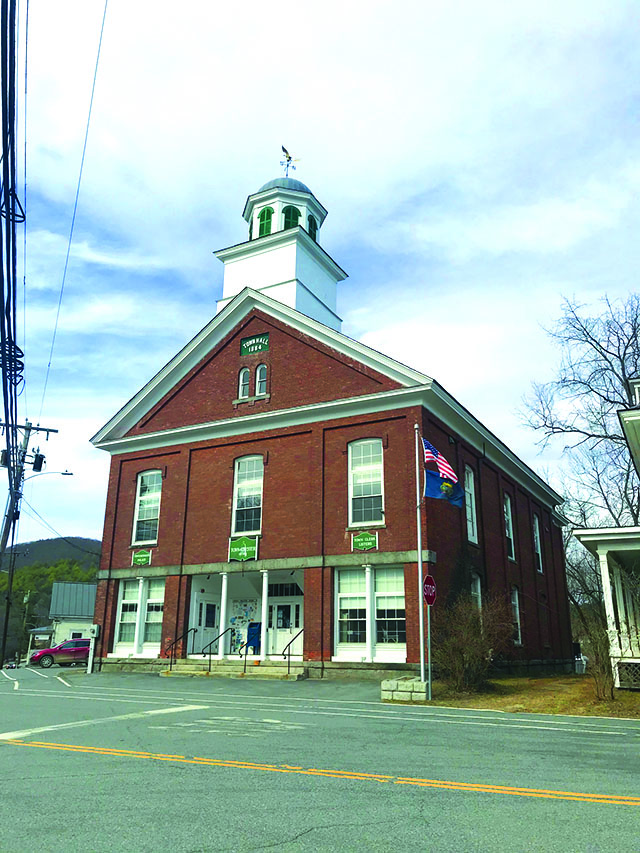
CHESTER, Vt. – The Chester Selectboard continued its hearing, recessed at the previous meeting in September, about amendments and changes to the town’s Unified Development Bylaws. At issue primarily were changes to Chester’s rural districts, which would take the R-120 and CR districts from a traditional minimum lot size approach to a density-based approach with no minimum lot size, renaming them RUR-5 and RUR-10 respectively. While the minimum lot sizes would be removed, the density-based approach stipulates a maximum number of buildable lots per total acreage in the zone; one per five acres in the RUR-5, and one per 10 acres in the RUR-10.
Planning Commission Chair Hugh Quinn addressed the board, explaining that he believed the purpose of density-based zoning was to “maintain larger blocks of open space…while at the same time allowing landowners some flexibility with the property they have.” Quinn argued that the current approach within those areas allows for “rural sprawl,” encouraging many homes spread out on minimum sized lots. Density-based zoning, he said, would allow for clusters of development on smaller lots, leaving larger areas undeveloped. Quinn noted that the overall density of the rural zones was, in theory, being reduced by the proposed changes. In response to feedback from the previous meeting, however, Quinn told the board that the planning commission had added two-acre minimum lot sizes to the proposed RUR-5 and RUR-10 districts. The current minimums in these areas are three and five acres, respectively.
Several of those present at the meeting, however, felt that this still left room for undesirable types of development within these districts. Resident Derek Suursoo expressed that he would have preferred to see 3- or 4-acre minimum lots in the RUR-10, and 3-acre minimum lots in the RUR-5. “I’m not into this cluster thing,” Suursoo told the board, “I would prefer to see minimum lot sizes.”
Resident Amy Mosher read from a letter she had prepared and submitted to the board, expressing her opposition to the density-based approach. “The HOME Act of 2023 notes that affordable housing is needed, and is supposed to be placed in the areas of town served by municipal water and sewer,” Amy Mosher said, “The rural districts are not areas where affordable housing is supposed to be developed.” She believed that the density-based approach is inconsistent with Chester’s Town Plan, which states that “development should be consistent with the existing density pattern of the area,” and also felt that the planned unit development (PUD) process which is already in place for conditional use in Chester would be sufficient to allow for cluster development where appropriate, without giving blanket approval to such development throughout the rural areas.
Resident Brian Mosher also spoke to the board about his concerns with the redrawn zoning map, with particular regard to the change in zone along Route 10 from Gassets to the border with North Springfield. The proposed rezoning would create a strip of higher density along Route 10, changing this area from three-acre minimum lots, to two acres. “I just think you’re going to invite speculators,” he said, saying he felt that residents in the area had not been adequately informed of the proposed change.
In light of this feedback, Quinn and town planning and zoning administrator Preston Bristow asked the board for direction, saying they would prefer to wrap up the rezoning process, and wanted to know whether the board would prefer they abandon the density-based approach. Quinn felt that, if that were the case, his personal preference would be to leave the R-120 and the CR districts unchanged. The board agreed to discuss at their next meeting the direction they would like the planning commission to take in revising the proposed changes.
The board also approved a funding request from Upstairs at Town Hall for $2,000. The money will come from the marketing line item in the town’s budget. Robert Nied, one of the group’s founders, described Upstairs at Town Hall as an “informal group of community volunteers” who are working to bring “cultural events” to Chester. The groups has recently brought several events to Chester’s Town Hall auditorium, including a reading by Vermont’s poet laureate. “We want to make [Chester] a hub for those kinds of cultural events,” Nied told the board.
The board responded positively to the request, with Board Chair Arne Jonynas telling Nied that the kinds of cultural events Upstairs at Town Hall was working to bring in were “some of the dreams that we had for that space” when it was renovated in the recent past. The organization will use the money to aid in the process of becoming a 501(c)(3) nonprofit.
The Chester Selectboard’s next meeting will take place on Wednesday, Nov. 6, at 6:30 p.m., at the Chester Town Hall.